Top Lessons I Learned from Creating an AI Blog Post for My Business
June 28, 2024
Key Takeaways from Creating an AI Blog Post for My Business
Shortcuts can be extremely attractive when you have a huge to-do list running for your business. But let’s face it, not all shortcuts are created equal. The shortcut in question today… AI blog posts. Good? Or Bad?
At Maggie Writes Copy, I believe that marketing doesn’t have to be complicated. So I decided to dive into the AI world for a couple weeks and see what I could learn and share.
While a couple months of dabbling in AI doesn’t make me an expert, I have formed some strong opinions on how AI and copywriting mix… or not.
Let’s dive right in and talk about the article I wrote, and posted using AI and why I don’t plan on making it part of my routine.
My AI Blog Post Experiment… Background Details
Let’s start by talking about what AI platform I used. When you’re using AI these days you have options. I chose to use Jacob McMillen’s Longform Blog Cyborg on Open AI.1
Jacob McMillen is known for writing excellent SEO copy for big-name companies using a combination of AI and his own writing.2 So I felt confident using his Generative Pre-training Transformer (GPT).
How the AI blog generator functioned.
I liked how the GPT processed my request to write an article. It started by generating an outline of an article based on the topic I gave along with the main keyword (for SEO).
Once I tweaked the outline, it then went through and generated section by section. I approved or requested changes to each section before moving on to the next.
Working in smaller sections seemed to keep the GPT from getting “overwhelmed” and spitting out weird content.
By the end of the process, I had a 2000-word article that was ready to be edited, fact-checked, humanized, and personalized.
Did you catch that last sentence? I couldn’t just publish the article.
This is where people get confused about AI, and it’s why a lot of subpar content is being published on the internet right now.
Editing AI Blog Posts to Be Publish-Ready
In case you’re wondering… I spent 3 hours editing the blog post that Chat GPT generated for me. About the same amount of time that it takes me to write the first draft of an original blog post.
At the end of the editing process, I still wasn’t completely satisfied with the post. Because it didn’t sound like me and it wasn’t formatted how I normally format.
In case you’re wondering, I actually published the post in question.3 Even though I wasn’t satisfied with the result. Because after spending roughly 5 hours throughout the whole process, I felt I had to.
My editing process:
- Brand voice: I worked really hard to try and make it sound like I wrote it. Not a computer. I still think this is one of the main ways the GPT failed me.
- Fact-checking: It actually got a lot of information wrong. For example, it told me I needed to optimize my emails for SEO. Emails don’t come up in search results, so this was 100% false. There were several of these glaringly wrong statements throughout the article.
- Humanizing: it lacked any anecdotal stories that build connection between the information presented and the human reading it.
- Personalizing: I needed to build a connection between my business and my reader’s needs.
- Editing: the GPT used the passive tense throughout a lot of the article, it was written at a high grade level making it read like a textbook, and used lots of run-on sentences.
- Formatting: it also wrote mostly in lists. While it’s good to use lists sometimes, it’s not ideal for the whole article to be comprised of 18 lists!
I spent 3-hours editing it and again, still wasn’t happy with the finished result. Here are the top issues I had with it related to copywriting.
The Issues My AI Blog Revealed
Let’s talk about some of the biggest issues I touched on above.
1. You have to check the output to make sure it’s accurate
When people generate their AI blog posts and immediately hit publish, they are spreading so much misinformation.
This is becoming a huge problem as a lot of people put a lot of trust in content that’s published on the internet.
As responsible business owners, it’s our job to make sure we aren’t part of the problem. This means fact-checking everything before it’s published.
2. It lacked the human touch of connection
Quite frankly, it was boring. I couldn’t relate directly to the writing with any emotion or feeling.
If I found that blog, I would have bounced off the article very quickly. Which in turn is bad for SEO and defeats half the purpose of the post in the first place.
3. There’s a question of ownership
I didn’t feel like the AI blog post belonged to me. This begs the question, is AI actually an ethical source of information?
Are we really generating articles that we have any stake in? Or is the shortcut an unethical way to try and fast-track our site authority?
4. It took a long time to have a publish-ready article
Probably the same amount of time – if not longer – that a normal blog post would take me. This begs the question, is it really a shortcut?

AI Copywriting Disclaimer…
I’m not saying that AI copywriters who use a combination of AI and editing to create content are doing it wrong, or are unethical. Everyone finds their own process. AI copywriting can be ethical.
But an AI blog post that’s published with no editing and formatting is questionable. And if you think AI is going to decrease the rates a copywriter is charging then you may want to think again.
Copywriting is so much more than just generating content. It’s about building relatability and connection with your customers. You’re not writing at them, you’re writing to them. In their words.
Now let’s talk about how AI can be a shortcut for your business.
Better Ways to Use AI in Your Writing Process
Just because AI isn’t the cost-effective solution to blog writing you might have thought it would be, doesn’t mean it isn’t useful. There are many ways that AI can speed up and even enhance blog posts that you write yourself.4
Brainstorming your post
For example:
“Generate a list of blog topics speaking to small business owners about their marketing. Include topics about SEO, email marketing, marketing funnels, and paid strategies”
Or
“Provide a list of headlines for a blog post about using AI to write Blog posts, the main keyword that should be included is AI Blog Posts.”
I just generated that second one and learned I needed to be more specific, as the list it generated was all about how AI was the future of blog posts. So I switched it up:
“Provide a list of headlines for a blog post about using AI to write Blog posts, the main keyword that should be included is AI Blog Posts. The main topic is that AI isn’t a replacement for copywriters.”
Here are the comparisons.
Initial AI Prompt
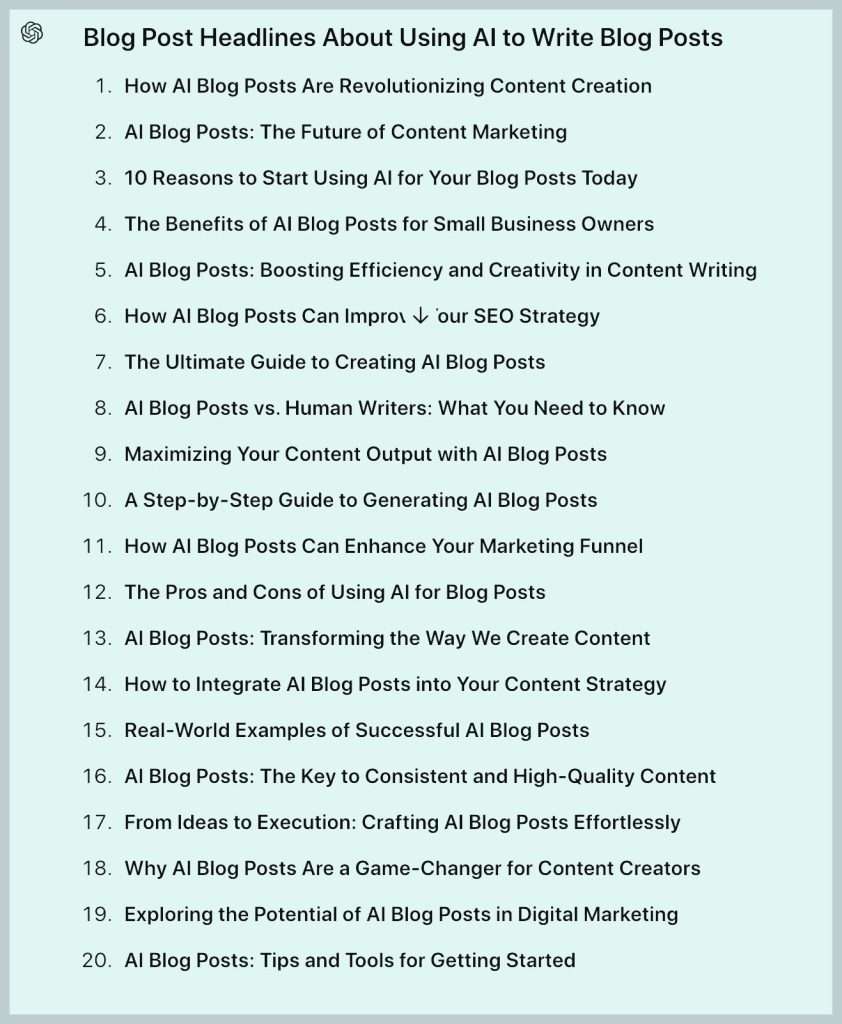
AI Prompt Rewrite
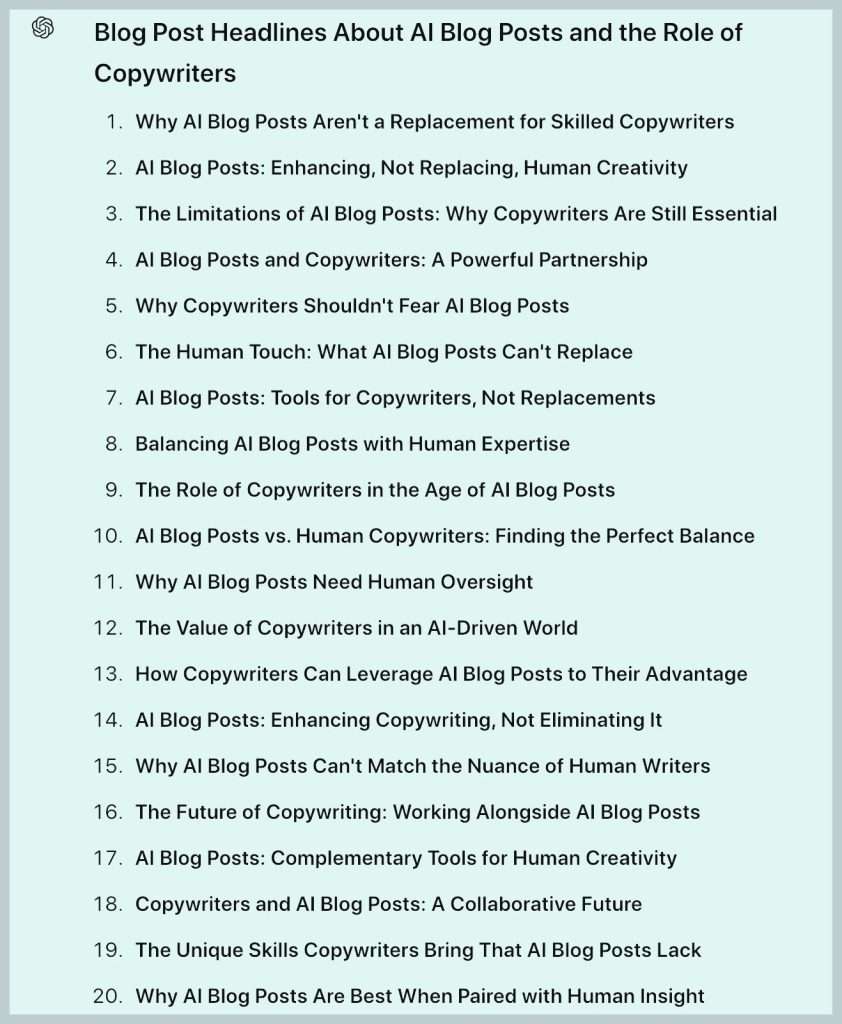
As you can see, I didn’t use any of these titles, but they did get my creative juices flowing and gave me a starting point.
Next, we’ll talk about how AI can help you structure a post.
Structuring your post
Sometimes the hardest part of a blog post is getting started. This is because you’re looking at a blank page and you have so many possibilities of where to take it. The good news is that AI is great for generating blog outlines.
After you look at what it creates for you, you might take a look at some competitor’s articles and see if it’s missing a big part of the topic and add that to your outline.
Once you have the article structure worked out, you’re good to start writing.
This can also help to create a much more cohesive article as it can help it flow more naturally.
Finally, let AI do the heavy lifting of polishing your article.
Editing and proofreading your post
Make sure all your i’s are dotted and t’s are crossed – the easy way.
You can also ask it to perform more complex editing like:
- Rewording a sentence that’s too long
- Checking if it matches the brand’s voice and tone guidelines
- Double checking there aren’t any massive topics missing from your article
Here are a couple of examples, I ran this blog post through Chat GPT before publishing:
Brand Voice Check
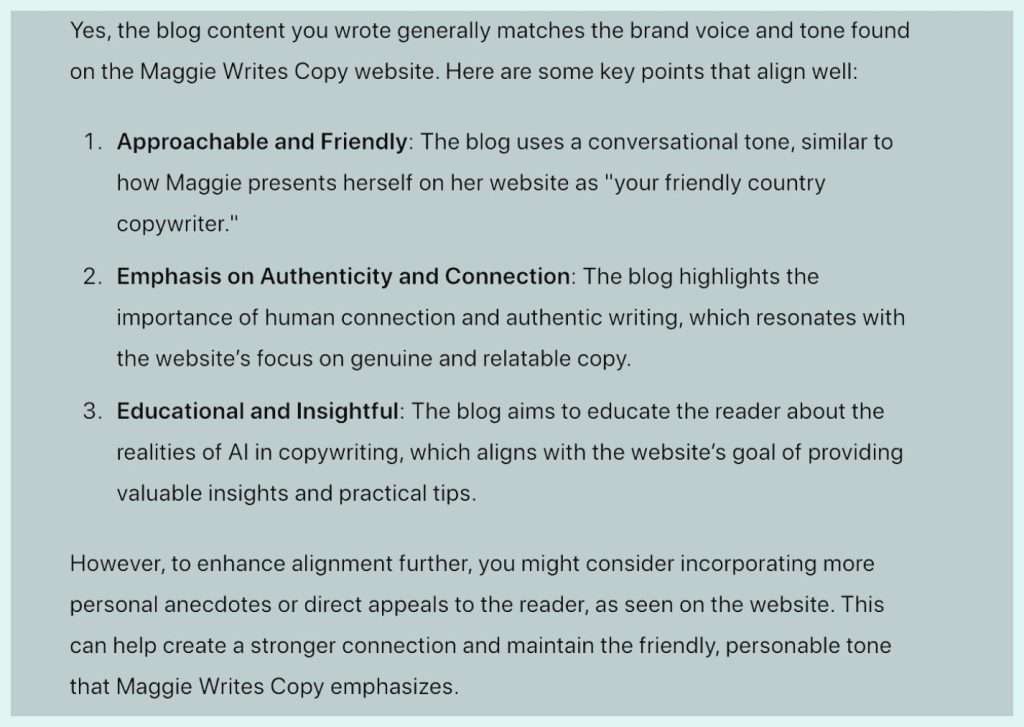
Missing Topic Check
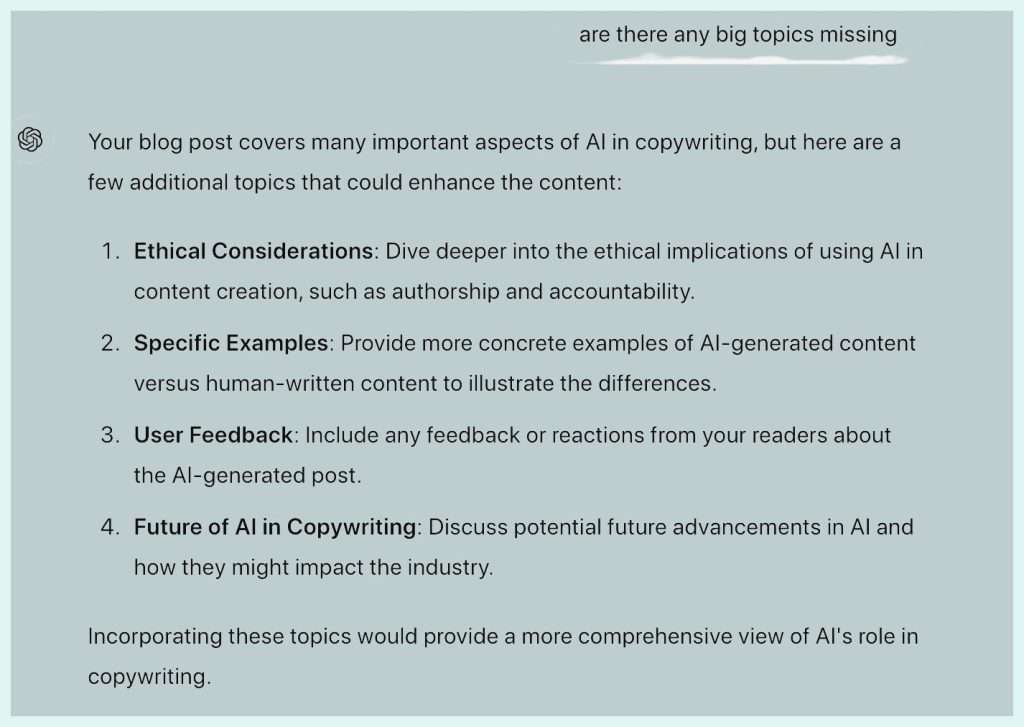
As you can see, AI is great for the smaller writing tasks rather than the bigger ones.
There’s one question that tends to get a lot of interest when it comes to AI blog posts…
Will AI Content Rank on Google?
The short answer… yes, it can. Google always tries to promote content that answers its reader’s questions best and quickest. So if an AI article is well-written and provides the best answer to a question, it can and will rank.
Google takes into account, the length of time people spend on a page as one of its metrics for ranking. So typically AI articles that have been heavily edited for many of the things mentioned above have a much better shot at ranking than an article that’s simply generated and posted.
The takeaway?
I Wrote an AI Blog Post…
…but was unsatisfied with the results. While I could hone my process and get really good at editing AI-generated content, tome it’s not worth it.
Whether I write it myself or use AI, it still takes a long time to get the end product right. So I might as well spend my time writing rather than repeated rounds of editing.
If you want to learn how to write your own content that ranks on Google, check out my new ebook, SEO for Beginners – How to Harness the Power of Google for Your Business.
Resources:
1 Longform Blog Cyborg – Open AI (Jacob McMillen)
2 Jacob McMillen – Jacob McMillen Copywriting
3 AI Blog Post Example – SEO and Email Marketing Strategy from MWC
4 Chat GPT uses – Check Copywriting
Maggie Schlegel
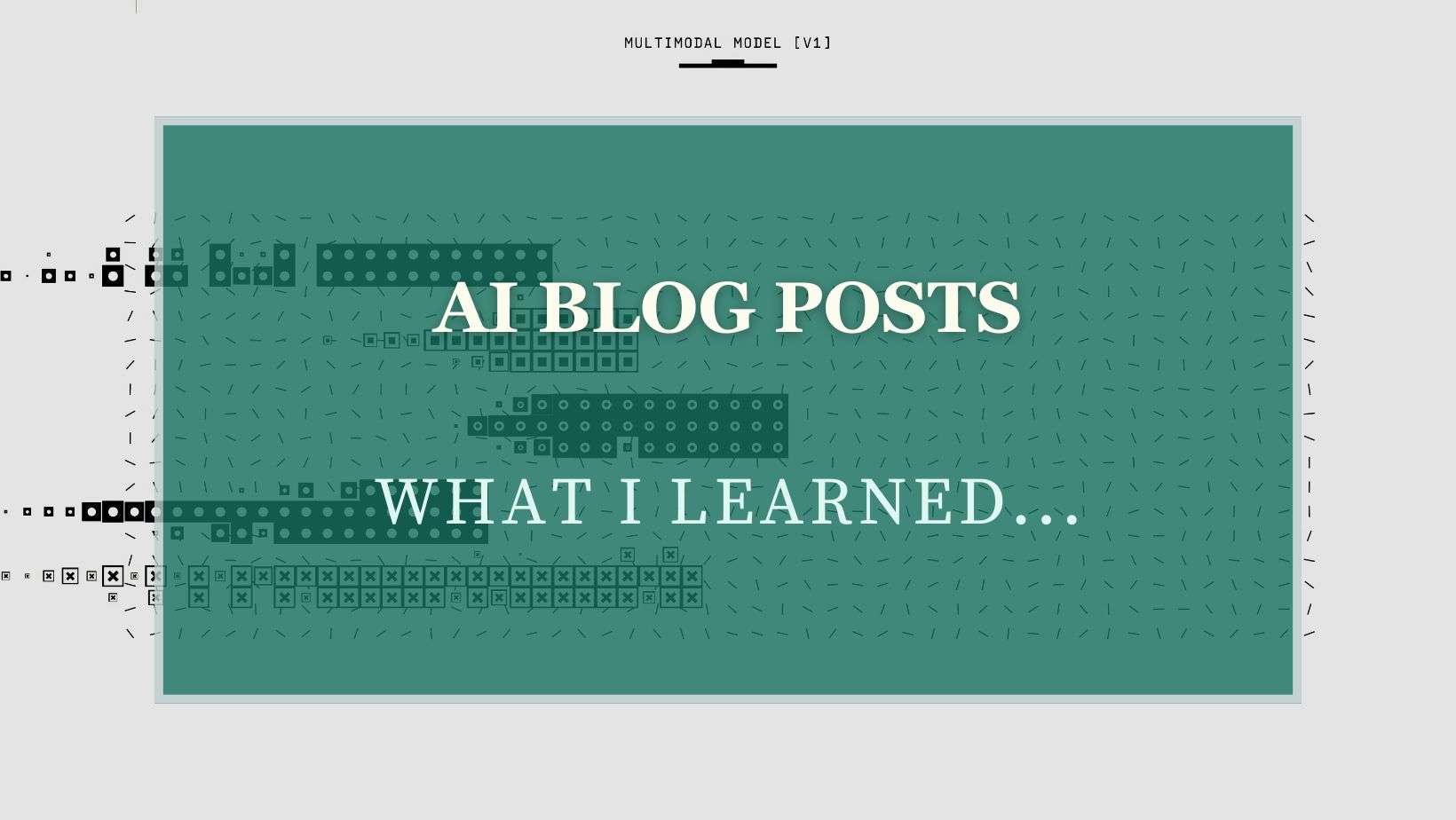
Leave a Reply Cancel reply
P.S. This opts you into my newsletter. But I promise no spam! Unsubscribe any time.